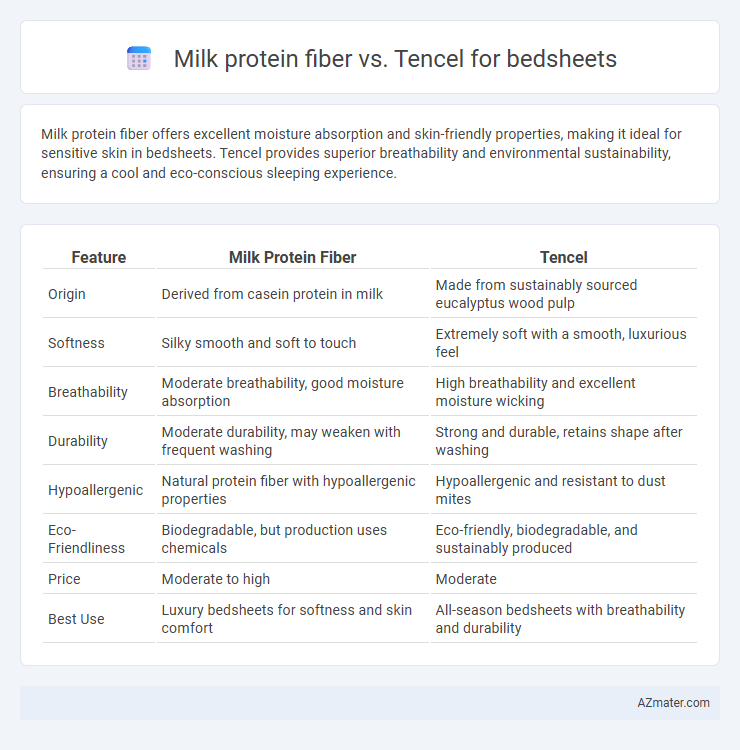Milk protein fiber offers excellent moisture absorption and skin-friendly properties, making it ideal for sensitive skin in bedsheets. Tencel provides superior breathability and environmental sustainability, ensuring a cool and eco-conscious sleeping experience.
Table of Comparison
| Feature | Milk Protein Fiber | Tencel |
|---|---|---|
| Origin | Derived from casein protein in milk | Made from sustainably sourced eucalyptus wood pulp |
| Softness | Silky smooth and soft to touch | Extremely soft with a smooth, luxurious feel |
| Breathability | Moderate breathability, good moisture absorption | High breathability and excellent moisture wicking |
| Durability | Moderate durability, may weaken with frequent washing | Strong and durable, retains shape after washing |
| Hypoallergenic | Natural protein fiber with hypoallergenic properties | Hypoallergenic and resistant to dust mites |
| Eco-Friendliness | Biodegradable, but production uses chemicals | Eco-friendly, biodegradable, and sustainably produced |
| Price | Moderate to high | Moderate |
| Best Use | Luxury bedsheets for softness and skin comfort | All-season bedsheets with breathability and durability |
Introduction to Sustainable Bedsheet Materials
Milk protein fiber and Tencel represent innovative sustainable bed sheet materials, each derived from eco-friendly sources with unique benefits. Milk protein fiber, made from casein found in milk, offers natural softness, moisture-wicking properties, and biodegradability, ideal for sensitive skin and reducing environmental impact. Tencel, produced from sustainably harvested eucalyptus wood pulp through a closed-loop process, provides breathability, durability, and excellent moisture management, making both fibers prominent choices in eco-conscious bedding solutions.
What is Milk Protein Fiber?
Milk protein fiber is a sustainable textile made from casein protein extracted from milk, offering softness and natural moisture-wicking properties ideal for bedsheets. It excels in breathability and skin-friendliness compared to synthetic fibers, making it hypoallergenic and suitable for sensitive skin. Compared to Tencel, another eco-friendly fabric derived from eucalyptus pulp, milk protein fiber provides a smoother texture and enhanced thermal regulation for comfortable sleep.
What is Tencel Fiber?
Tencel fiber, derived from sustainably sourced eucalyptus wood pulp, is known for its exceptional softness, breathability, and moisture-wicking properties, making it ideal for bedsheets. Unlike milk protein fiber, which is created from casein proteins found in milk and offers a smooth, silk-like feel, Tencel excels in durability and environmental sustainability due to its closed-loop production process. Bedsheets made from Tencel provide a cooler sleep environment and enhanced resistance to bacteria and allergens, contributing to healthier and more comfortable bedding.
Production Processes: Milk Protein Fiber vs Tencel
Milk protein fiber is produced through a wet spinning process by extracting casein from milk, which is then dissolved and regenerated into fibers, emphasizing sustainable waste valorization. Tencel, derived from sustainably sourced eucalyptus wood pulp, undergoes a closed-loop lyocell process where solvents are recycled, minimizing environmental impact. Both fibers prioritize eco-friendly production but differ in raw material origins and chemical processing techniques.
Softness and Comfort Comparison
Milk protein fiber bedsheets offer exceptional softness due to their protein-rich composition, closely mimicking the feel of natural silk, which enhances comfort and breathability. Tencel sheets, made from eucalyptus wood pulp, excel in moisture-wicking and temperature regulation, providing a cool and smooth surface ideal for sensitive skin. Both fibers deliver superior softness, but milk protein fiber is often preferred for its silk-like texture, while Tencel stands out for durability and eco-friendly comfort.
Breathability and Moisture-Wicking Properties
Milk protein fiber bedsheets offer natural moisture-wicking properties combined with excellent breathability, making them ideal for maintaining a cool and dry sleeping environment. Tencel bedsheets, made from sustainably sourced eucalyptus fibers, excel in absorbing moisture and promoting airflow, ensuring a comfortable and hypoallergenic sleep surface. Both materials surpass traditional cotton in regulating temperature and reducing humidity, but Tencel's superior moisture management makes it especially effective for hot sleepers.
Durability and Longevity
Milk protein fiber bedsheets exhibit high durability due to their strong molecular structure and resistance to wear, maintaining softness and shape after multiple washes. In comparison, Tencel fibers offer exceptional longevity through their natural moisture-wicking and breathability properties, which reduce fabric degradation caused by bacteria and sweat. Both materials provide durable bedding options, with milk protein fiber excelling in tensile strength and Tencel excelling in sustainable long-term freshness.
Hypoallergenic and Skin-Friendly Qualities
Milk protein fiber offers excellent hypoallergenic properties by naturally inhibiting bacterial growth, making it an ideal choice for sensitive skin and allergy sufferers. Tencel, derived from eucalyptus wood pulp, provides superior moisture-wicking and breathability that helps maintain skin hydration and reduces irritation. Both fibers excel in skin-friendly qualities, but milk protein fiber's antimicrobial benefits give it a slight advantage for allergy-prone individuals.
Environmental Impact and Sustainability
Milk protein fiber is biodegradable, produced from casein proteins extracted from milk waste, reducing reliance on synthetic fibers and minimizing environmental pollution. Tencel, derived from sustainably sourced eucalyptus wood through a closed-loop process, offers exceptional biodegradability and low water consumption during production. Both materials contribute to eco-friendly bedding, but Tencel's established certification and efficient resource use position it as a leading sustainable option in bedsheet manufacturing.
Price and Value for Consumers
Milk protein fiber bedsheets typically cost more than Tencel sheets but offer unique benefits like antimicrobial properties and skin-friendly softness that justify the higher price for consumers seeking luxury. Tencel sheets, derived from sustainably sourced eucalyptus, provide excellent moisture-wicking and breathability at a generally lower price point, making them a value-driven option for eco-conscious buyers. Price-conscious consumers aiming for durability and eco-friendliness might favor Tencel, while those prioritizing novelty and skin benefits may find milk protein fiber worth the premium.

Infographic: Milk protein fiber vs Tencel for Bedsheet
 azmater.com
azmater.com